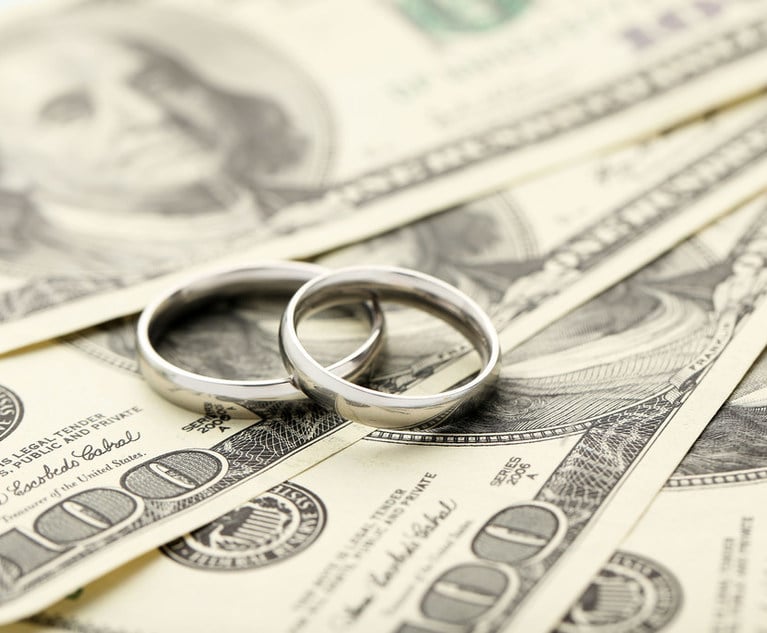 Close up photo of bitcoin crypto currency in dark. Credit: fotofabrika/Adobe Stock
Close up photo of bitcoin crypto currency in dark. Credit: fotofabrika/Adobe StockBitcoin, Cryptocurrency Practices Stand to Gain From Trump Election
“There’s definitely reason to have what I would call measured optimism" about how a second Trump presidency can impact crypto markets, says Cooley securities litigation partner William Pao.
November 12, 2024 at 04:47 PM
5 minute read
What You Need to Know
- A second Trump presidency is likely to have positive impact on cryptocurrency businesses, lawyers tell The Recorder.
- While the regulatory landscape remains unclear, partners at top tech law firms say they anticipate more international business coming to the U.S.
- Trump himself is a crypto entrepreneur, and has raised $14 million to issue a dollar-backed Trump Stablecoin
Although the incoming 47th president has changed his tune on Bitcoin and cryptocurrencies in the past, he now appears to be bullish on the idea, and the upcoming inauguration of Donald Trump could prompt a windfall for attorneys working in the practice.
Trump has floated some ambitious policy changes that would involve crypto, including the possibility of creating a national bitcoin reserve and a crypto advisory council, firing U.S. Securities and Exchange Commission chair Gary Gensler, and banning the Federal Reserve from issuing a digital dollar as a central bank currency in favor of selling his own Trump Stablecoin backed by the dollar. Stablecoin, which would be issued by Trump's crypto outfit World Liberty Financial, raised $14 million in its first token sale.
The crypto markets reacted favorably to news of a second Trump term, with Bitcoin up 8% on Nov. 6 following news of Trump’s reelection, hitting an all-time high of $76,000.
“I think it’s going to be very positive,” Venable partner, co-chair and co-founder of the firm’s blockchain and digital currencies group Chris O’Brien said of how Trump’s reelection could affect his practice. “Of course, we won't know until we see action, but he is himself, a crypto entrepreneur now [and] he was supported very strongly by the industry.”
But for all Trump’s public support of cryptocurrency lately, it remains to be seen which policies he will enact, or how.
“There’s definitely reason to have what I would call measured optimism,” said William Pao, partner at Cooley whose practice focuses on commercial and securities litigation. “President Trump has been much more welcoming of crypto than probably any administration, including the first Trump administration.”
That said, Trump’s philosophy on crypto has definitely evolved. “Keep in mind, in his first administration, he was a little bit skeptical about crypto,” Pao said of Trump. “He’s referred to crypto at some point, as a scam against the dollar. He's raised questions about whether unregulated crypto assets can facilitate unlawful behavior.”
O’Brien also noted, “There’s been more than a slight change in what we’ve heard from the Trump campaign as compared to the first Trump administration” regarding crypto, he said, adding that the president-elect seems to have embraced the digital currency even more since first taking office.
Just because Trump is optimistic about cryptocurrency or its possibility to enrich him, that doesn’t guarantee he would allow the industry free reign.
“It’s important to keep in mind that while he's definitely signaled that he's in favor of reducing regulatory barriers for crypto companies, it was really under the first Trump administration that we saw the beginnings of regulation by enforcement, where you had high profile enforcement actions,” Pao said.
Depending on if the Trump administration moves to reclassify cryptocurrencies as commodities instead of securities, the regulatory oversight could fall on the Commodity Futures Trading Commission, instead of the SEC. SEC Chairman Gensler has a pre-approved term through 2026, but he could resign. It's not uncommon for SEC leadership to do so during a presidential adminstrative shift. And Trump is certainly no fan of Gensler, promising to fire him on the first day of his presidency.
Trump has seemed more bullish on crypto this time around–perhaps in part because of his ties to campaign backer Elon Musk, a longtime proponent of cryptocurrencies including meme coins like Dogecoin. “Look at the prominence of Elon Musk, apparently, in the administration,” O’Brien said. “He’s a crypto booster and certainly in the community and supportive of it, so it seems like a pretty large change in the rhetoric.”
But as it’s currently less than a week after his election, the finer details of Trump’s plans for policies, including those about cryptocurrencies, have yet to emerge.
“All of those things, however, are a little bit light on the details, and we have to see what the administration will do,” Pao said. “He has an agenda with a lot of different issues on it, so we have to see what priority crypto takes.”
Regardless of Trump’s specific plans for cryptocurrencies, lawyers said the election will almost certainly provide a rush of new business and also likely open their existing clientele up to the possibility of expanding operations in the United States.
“The response is absolute enthusiasm when we're talking just about the impact on their business,” said Isabelle Sterling, a commodity attorney at BakerHostetler in San Francisco and former clerk for the SEC. “People are feeling really, really positive that they will not only be in a friendly environment here in the U.S. going forward, but also that there will be regulatory clarity.”
Sterling said that she’s heard positive feedback on the election from her clients, most of whom are “are holders of crypto, so not only do they see their portfolios going up, but also its optimism around their ability to go forward with their business in the US, which many didn't think they would be able to do.”
Venable expects international clients to increase their domestic business in the U.S. if regulations are favorable during a Trump term, O’Brien said. “A lot of jurisdictions around the world have been more favorable to crypto faster than the U.S., but the U.S. is still the largest capital market in the world,” he noted. “It’s natural that folks operating crypto businesses internationally would look at the U.S. market and say, ‘It looks like it’s going to get clearer and more friendly, so let’s prepare for that.’”
NOT FOR REPRINT
© 2025 ALM Global, LLC, All Rights Reserved. Request academic re-use from www.copyright.com. All other uses, submit a request to [email protected]. For more information visit Asset & Logo Licensing.
You Might Like
View All
‘Not a Regulatory Gray Area’: CFTC Secures $5M Settlement From Gemini
3 minute read
Data Breach Lawsuit Against Byte Federal Among 1,500 Targeting Companies in 2024
4 minute read
Solana Labs Co-Founder Allegedly Pocketed Ex-Wife’s ‘Millions of Dollars’ of Crypto Gains
4 minute read
Trending Stories
- 1New York’s Proposed Legislation Restraining Transfer of Real Property
- 2Withers Hires Lawyers, Staff From LA Trusts and Estates Boutique
- 3To Speed Criminal Discovery, NY Bill Proposes Police-to-Prosecutor Pipeline For Records
- 4Merchan Rejects Trump's Bid to Delay Manhattan Sentencing
- 5High-Low Settlement Agreement 'Does Not Alone Establish Bias:' State High Court Affirms $20M Med Mal Verdict
Who Got The Work
Michael G. Bongiorno, Andrew Scott Dulberg and Elizabeth E. Driscoll from Wilmer Cutler Pickering Hale and Dorr have stepped in to represent Symbotic Inc., an A.I.-enabled technology platform that focuses on increasing supply chain efficiency, and other defendants in a pending shareholder derivative lawsuit. The case, filed Oct. 2 in Massachusetts District Court by the Brown Law Firm on behalf of Stephen Austen, accuses certain officers and directors of misleading investors in regard to Symbotic's potential for margin growth by failing to disclose that the company was not equipped to timely deploy its systems or manage expenses through project delays. The case, assigned to U.S. District Judge Nathaniel M. Gorton, is 1:24-cv-12522, Austen v. Cohen et al.
Who Got The Work
Edmund Polubinski and Marie Killmond of Davis Polk & Wardwell have entered appearances for data platform software development company MongoDB and other defendants in a pending shareholder derivative lawsuit. The action, filed Oct. 7 in New York Southern District Court by the Brown Law Firm, accuses the company's directors and/or officers of falsely expressing confidence in the company’s restructuring of its sales incentive plan and downplaying the severity of decreases in its upfront commitments. The case is 1:24-cv-07594, Roy v. Ittycheria et al.
Who Got The Work
Amy O. Bruchs and Kurt F. Ellison of Michael Best & Friedrich have entered appearances for Epic Systems Corp. in a pending employment discrimination lawsuit. The suit was filed Sept. 7 in Wisconsin Western District Court by Levine Eisberner LLC and Siri & Glimstad on behalf of a project manager who claims that he was wrongfully terminated after applying for a religious exemption to the defendant's COVID-19 vaccine mandate. The case, assigned to U.S. Magistrate Judge Anita Marie Boor, is 3:24-cv-00630, Secker, Nathan v. Epic Systems Corporation.
Who Got The Work
David X. Sullivan, Thomas J. Finn and Gregory A. Hall from McCarter & English have entered appearances for Sunrun Installation Services in a pending civil rights lawsuit. The complaint was filed Sept. 4 in Connecticut District Court by attorney Robert M. Berke on behalf of former employee George Edward Steins, who was arrested and charged with employing an unregistered home improvement salesperson. The complaint alleges that had Sunrun informed the Connecticut Department of Consumer Protection that the plaintiff's employment had ended in 2017 and that he no longer held Sunrun's home improvement contractor license, he would not have been hit with charges, which were dismissed in May 2024. The case, assigned to U.S. District Judge Jeffrey A. Meyer, is 3:24-cv-01423, Steins v. Sunrun, Inc. et al.
Who Got The Work
Greenberg Traurig shareholder Joshua L. Raskin has entered an appearance for boohoo.com UK Ltd. in a pending patent infringement lawsuit. The suit, filed Sept. 3 in Texas Eastern District Court by Rozier Hardt McDonough on behalf of Alto Dynamics, asserts five patents related to an online shopping platform. The case, assigned to U.S. District Judge Rodney Gilstrap, is 2:24-cv-00719, Alto Dynamics, LLC v. boohoo.com UK Limited.
Featured Firms
Law Offices of Gary Martin Hays & Associates, P.C.
(470) 294-1674
Law Offices of Mark E. Salomone
(857) 444-6468
Smith & Hassler
(713) 739-1250






